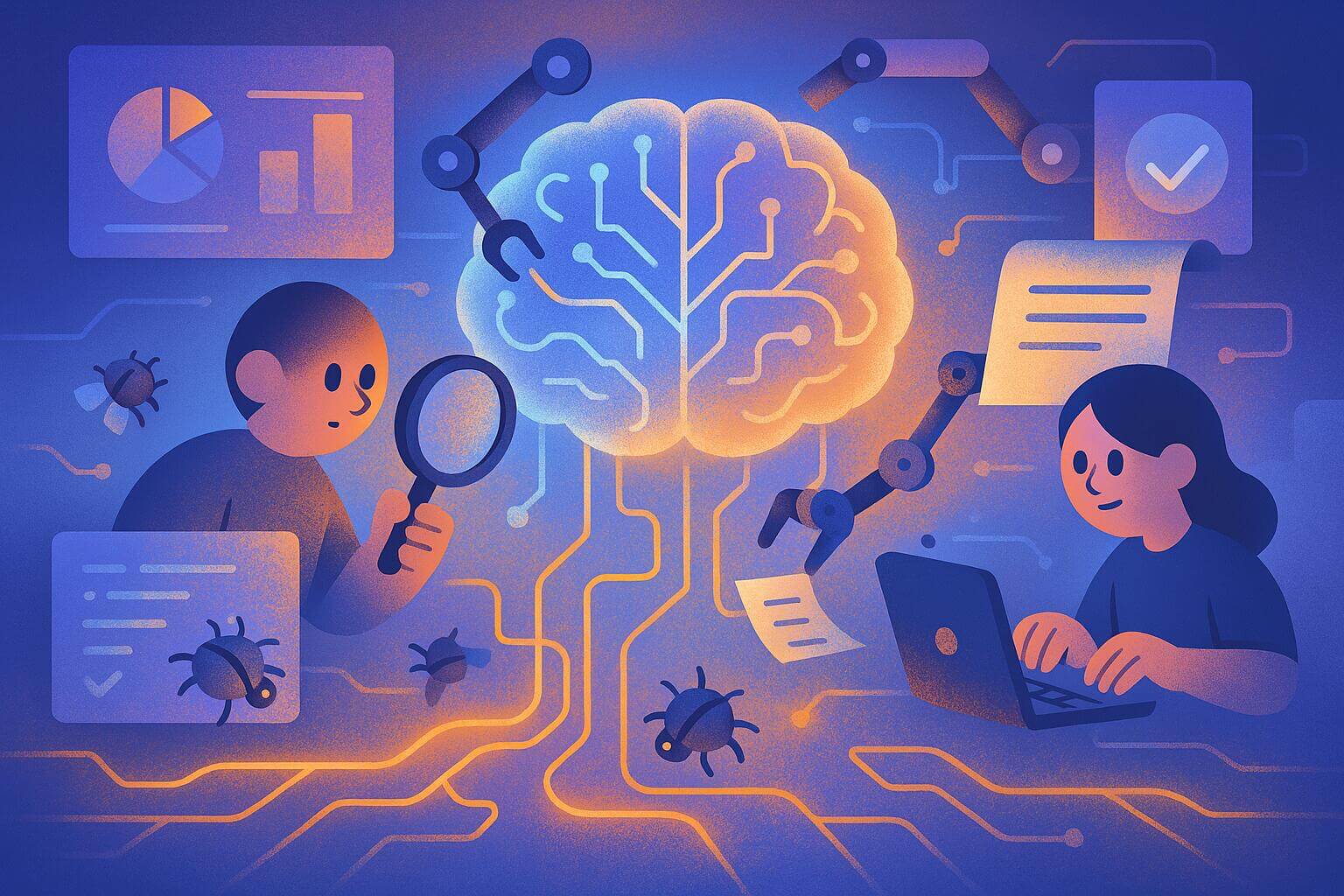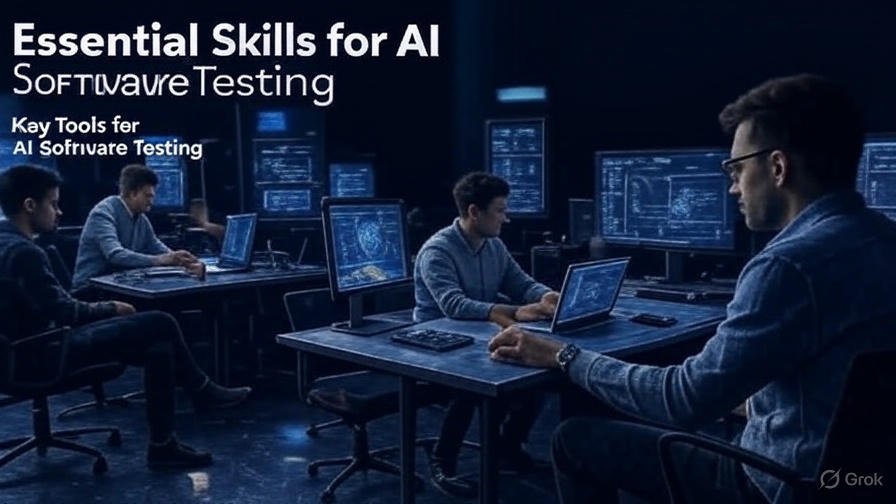
Artificial Intelligence (AI) is reshaping industries, including software testing. AI software testers ensure that AI systems are reliable, accurate, and ethical. This guide presents the essential skills, tools, and a practical roadmap for becoming an AI software tester in 2025 and beyond.
Table of Contents
- What Does an AI Software Tester Do?
- Essential Skills for AI Software Testing
- Key Tools for AI Software Testing
- Roadmap to Becoming an AI Software Tester
- Frequently Asked Questions (FAQ)
- Conclusion
What Does an AI Software Tester Do?
An AI software tester is responsible for verifying that AI systems and models work correctly without biases, ensuring they meet performance expectations. Key tasks include:
- Testing AI models for accuracy, reliability, and fairness
- Validating input data and output results
- Detecting ethical issues and biases in AI algorithms
- Creating and maintaining automated test processes for efficiency
- Collaborating with developers and data scientists to improve AI outcomes
Essential Skills for AI Software Testing

Technical Skills
- Core Testing Fundamentals: Master manual and automated testing—writing test cases, defect identification, test execution, and knowledge of SDLC and Agile/DevOps practices
- Programming & Scripting: Python is essential for AI/ML testing and automation (libraries like PyTest, TensorFlow, PyTorch). Java and JavaScript are important for test frameworks. Bash or PowerShell scripting aids environment setup. SQL/NoSQL skills for data validation
- AI/ML Knowledge: Understand machine learning principles, algorithms (supervised/unsupervised learning, neural networks), and AI model training and evaluation
- Data Analysis: Ability to preprocess, explore, and analyze datasets using pandas, NumPy, and data visualization tools like Excel or Power BI
- Testing Frameworks & Tools: Familiarity with Selenium, Appium, TestNG, pytest, and AI-specific tools like TensorFlow Model Analysis and Great Expectations
- Cloud Platforms: Experience with AWS, Google Cloud, or Azure for deploying and testing AI models at scale
- Performance & Security Testing: Basic knowledge of tools like JMeter and OWASP to ensure AI applications are performant and secure
- Version Control & CI/CD: Proficiency with Git and continuous integration tools such as Jenkins to integrate testing into modern development pipelines
Soft Skills
- Analytical Thinking: Needed to identify edge cases, detect anomalies, and interpret complex test results
- Problem Solving: Ability to troubleshoot AI-specific system challenges effectively
- Communication: Collaborate well with cross-functional teams and document findings clearly and concisely
- Adaptability: Comfortable working in fast-evolving AI-driven environments requiring continuous learning
Key Tools for AI Software Testing
| Category | Tools |
|---|---|
| Test Automation | Selenium, Appium, TestNG, Cypress |
| AI-Specific Testing | TensorFlow Model Analysis, Great Expectations, testRigor, Applitools, Mabl |
| Bug Tracking | Jira, Bugzilla |
| Version Control | Git |
| Performance Monitoring | Prometheus, Grafana |
| Scripting/Programming | Python, Java, JavaScript, Bash/PowerShell |
These tools facilitate automation, data validation, bias detection, and AI model performance monitoring.
Roadmap to Becoming an AI Software Tester
Learn Software Testing Fundamentals:
- Grasp manual and automated testing principles, test case design, black-box and white-box techniques
- Recommended resources: ISTQB Foundation Level certification, Coursera, Udemy
Gain Programming and Data Skills:
- Master Python or Java for scripting and automation
- Learn data handling with pandas, NumPy, SQL
- Practice scripting for environment setup
understand AI and Machine Learning:
- Study machine learning foundations and frameworks like TensorFlow and PyTorch
- Take specialized AI testing courses on platforms like edX and Pluralsight
Get Hands-On Experience:
- Contribute to open-source AI projects or build sample AI testing projects
- Build a portfolio demonstrating test automation scripts and AI model validation
Earn Certifications:
- Consider ISTQB AI Testing, AWS Certified Machine Learning, or similar credentials
Stay Current and Network:
- Follow industry blogs, join AI and QA communities, attend webinars and conferences
- Apply to roles such as AI QA Engineer or ML Testing Specialist
- Leverage LinkedIn and tech networks for career opportunities
Frequently Asked Questions (FAQ)
Q1: Do I need a degree to become an AI software tester?
A: While a degree in computer science or a related field is helpful, it is not mandatory. Self-learning, certifications, and hands-on experience can sufficiently prepare you for AI testing roles.Q2: How long does it take to become an AI software tester?
A: Depending on your existing background, it typically takes 6 months to 2 years to develop the necessary skills and practical experience.Q3: What distinguishes AI software testing from traditional software testing?
A: AI software testing focuses on validating data quality, model accuracy, fairness, and ethical considerations. Traditional testing primarily centers on functionality, user interfaces, and performance.Q4: Are there specific certifications for AI testing?
A: Yes. Certifications like ISTQB AI Testing, AWS Certified Machine Learning, and AI-related courses from industry leaders like Google are highly valued.
Conclusion
Becoming an AI software tester in 2025 requires a solid foundation in traditional testing combined with specialized AI, programming, and data skills. Leveraging up-to-date tools, acquiring certifications, and gaining hands-on experience will position you as a valuable contributor in AI development teams. Stay curious, continue learning, and actively engage in the AI testing community to thrive in this dynamic and rewarding field.
"Becoming an AI Software Tester isn’t just a career move — it’s a future-ready skillset. At Cinute Digital, we guide testers through the tools, skills, and roadmap to thrive in AI-powered QA."